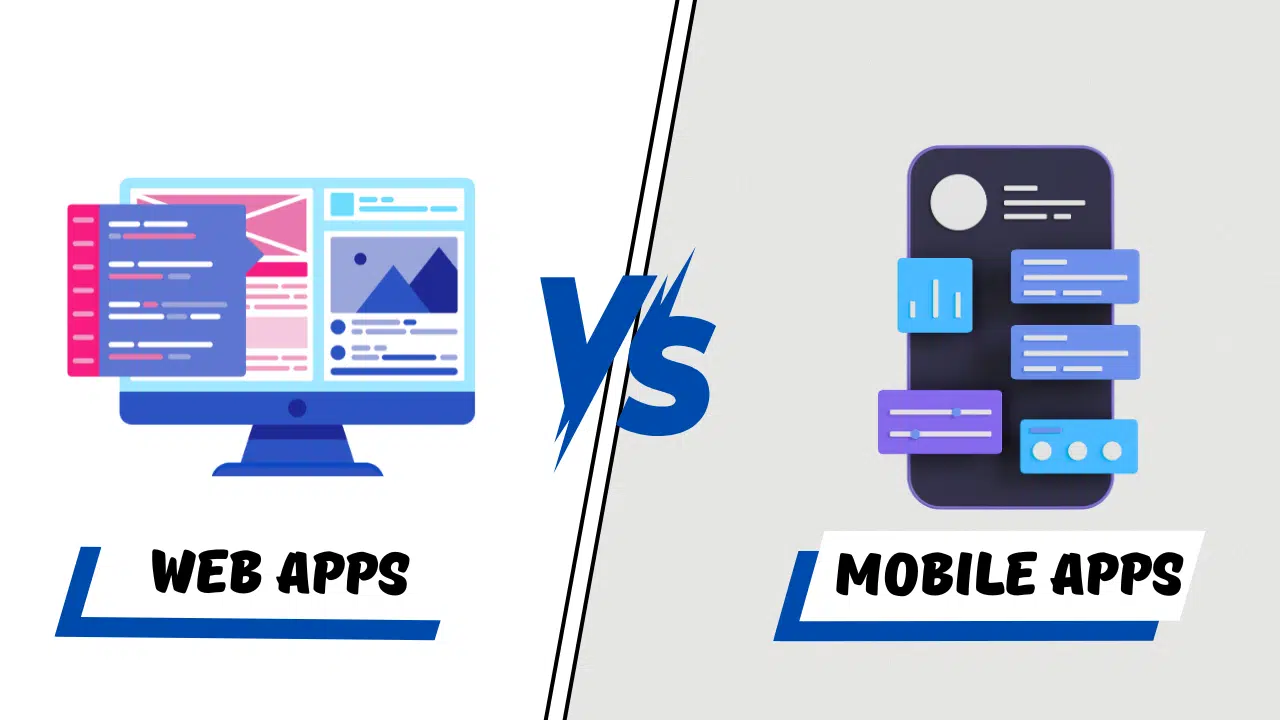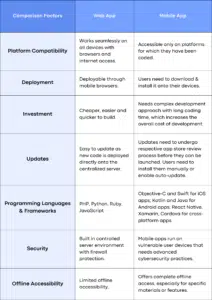If you are planning on starting a new business or launching a new digital product, deciding on whether to go with a mobile or web app might seem confusing. Even though mobile and web apps are equally beneficial for businesses to mark their digital presence, they serve different audience groups and are meant to fulfil varying goals.
So, this article will address the common conflict between web apps and mobile apps, giving you a detailed breakdown on how they differ from one another, and which of the two options is ideal for you.
What is a Web App and a Mobile App?
Before diving deeper into the argument on mobile app vs web app, here’s a brief overview of their definitions:
Web App:
Web applications are software solutions that are accessible on different web browsers across the internet. Users can interact with web apps on all of their devices, including smartphones, laptops, tablets, and desktops, without the need to download them. Some of the examples of web apps are Amazon, Twitter (Now X), Gmail, Canva, Trello, etc.
Mobile App:
On the contrary, mobile applications are built to run specifically on smartphones, wearables, or tablets. Users need to download and install these apps onto their devices to avail of their features or functionalities. You can either stick with a native mobile app, built specifically for Android/iOS platforms, or go with cross-platform development to make it accessible on both.
Mobile apps can serve diverse purposes such as productivity, shopping, communication, entertainment, and more. Some of the popular examples include Netflix, TikTok, Spotify, etc.
Key Differences Between Web App and Mobile App
Here are the key differences between a web app and a mobile app for you to decide on what would suit your business needs the best:
1. Platform Compatibility:
Web apps are built to work seamlessly on all devices that have a browser and internet access. Mobile applications, on the other hand, can only be accessed on platforms on which they have been coded.
The web applications might provide better brand outreach to a large number of users across different platforms, but mobile apps offer a more immersive, deeper, and satisfying user experience.
2. Deployment:
Users can deploy web apps through a mobile browser, whereas the code of a mobile app gets downloaded to users’ devices. It is easier for users to follow through with a link to access or use a web app, whereas with mobile apps, they must download & install it first.
Due to this deployment property, people prefer sticking with mobile apps for a longer time than with web apps. It is because web apps disappear right after users close their browser tabs, whereas mobile apps stick until they are uninstalled from the device.
3. Investment:
Building web apps is cheaper, easier, and quicker when compared with mobile apps. The technology behind web app development is less complicated, and there are several tools and resources for swiftly executing it.
On the other hand, mobile app development is a more complex approach and demands long coding time from developers. The time, effort, and cost of mobile app development will also depend on whether you choose a native or cross-platform approach.
4. Updates:
Web apps are easy to update, as the new code is directly deployed onto the centralized server. On the other hand, mobile app updates need to be installed from App Store/Play Store.
With web apps, the developers have complete control over the version consistency and can quickly roll out or roll back the changes. For mobile apps, the updates need to go through the review process by the respective app stores before they can be rolled out.
5. Programming Languages & Frameworks:
The programming languages for mobile app development vary, depending on the preferred platform or type of app being built. For instance, Objective-C and Swift are the coding languages if you are building iOS apps. On the other hand, Android mobile apps are built using Kotlin and Java.
The hybrid or cross-platform mobile apps are developed with React Native, Appcelerator, Cordova, C#, or Xamarin frameworks. Web applications, on the other hand, are built using PHP, Ruby, Python, and JavaScript.
6. Security:
Web apps are primarily operated in a controlled server environment with firewall protection. On the other hand, mobile applications run on vulnerable end-user smartphones or tablets, which increases the surface area of the attack.
However, with modern development strategies and security implementations, mobile apps are now built with advanced encryption and cybersecurity practices.
7. Offline Accessibility:
Web apps are solely dependent on internet browsers, for which they offer very limited offline capabilities. Mobile apps, on the other hand, can offer complete offline access, giving users the chance to use specific features or materials, even when they aren’t connected to any active internet connection.
What to Choose First? Web App or Mobile App?
Now that you know the key differences between web apps and mobile apps, it is time you get a clear idea of what would suit your business needs the most. Below are a few situations based on which you can decide whether you should go with a mobile app or a web app:
When to Choose Web App Development?
You should build a web app if:
- You want a wider audience outreach across different platforms or devices.
- You prioritize the cost-effectiveness of developing web apps over native mobile apps.
- You seek faster deployment and easy accessibility without the need for users to download or install anything onto their devices.
- You want flexibility in terms of maintenance and updates.
When to Choose Mobile App Development?
You should build a mobile app if:
- You want to give your users a more immersive experience through native capabilities of the mobile devices, such as push notifications, intuitive gestures, GPS, and others.
- You want to boost the user engagement quotient by facilitating personalized interactions that can result in customer loyalty and satisfaction.
- You want to introduce offline functionality for users to have access to certain content or features, even without internet connectivity.
- You prioritize quick revenue generation through different options such as subscription-based plans, in-app purchases, targeted ads, and more.
Let Simpalm Help You Pick the Right App Development Initiative for Your Business Needs!
When starting your business, choosing whether to build a web app or a mobile app can be the first important decision that can lead your brand to success. This article has covered all the key differences between web apps and mobile apps, making it easier for you to decide on what would work best for your business.
However, if you are still in a dilemma of what to pick among the two, let our experts at Simpalm guide you through the process. Our experts will analyze your business requirements and weigh them against the two app development approaches.
This way, we will be giving you a logical and straightforward decision on whether you should start off your business with a web app or a mobile app. Not just that, but being the best web app and mobile app development in USA, we have proficient developers to provide you with end-to-end services.
From ideation to deployment and even post-launch maintenance, Simpalm is here to help you kickstart your business with high-performance and robust mobile or web apps.

 App Development
App Development Web Engineering
Web Engineering AI Services
AI Services Health / Fitness
Health / Fitness Education
Education Social
Social Nonprofit
Nonprofit Fintech
Fintech Logistics
Logistics Government
Government HR Software
HR Software About Simpalm
About Simpalm Our News
Our News Client Testimonials
Client Testimonials Careers
Careers Awards
Awards Resources
Resources Information
Information



